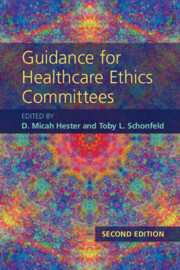Book contents
- Guidance for Healthcare Ethics Committees
- Guidance for Healthcare Ethics Committees
- Copyright page
- Dedication
- Contents
- Contributors
- Preface
- Section 1 The Context of Healthcare Ethics Committee Work
- Chapter 1 Introduction
- Chapter 2 Brief Introduction to Ethics and Ethical Theory
- Chapter 3 Healthcare Ethics Committees and the Law
- Chapter 4 Understanding and Addressing Health Disparities through a Racial Paradigm
- Chapter 5 Cultural and Religious Issues in Health Care
- Chapter 6 Moral Distress
- Section 2 Consultation
- Section 3 Policy Development and Organizational Issues
- Index
- References
Chapter 5 - Cultural and Religious Issues in Health Care
from Section 1 - The Context of Healthcare Ethics Committee Work
Published online by Cambridge University Press: 17 February 2022
- Guidance for Healthcare Ethics Committees
- Guidance for Healthcare Ethics Committees
- Copyright page
- Dedication
- Contents
- Contributors
- Preface
- Section 1 The Context of Healthcare Ethics Committee Work
- Chapter 1 Introduction
- Chapter 2 Brief Introduction to Ethics and Ethical Theory
- Chapter 3 Healthcare Ethics Committees and the Law
- Chapter 4 Understanding and Addressing Health Disparities through a Racial Paradigm
- Chapter 5 Cultural and Religious Issues in Health Care
- Chapter 6 Moral Distress
- Section 2 Consultation
- Section 3 Policy Development and Organizational Issues
- Index
- References
Summary
HEC members are often confronted by cases where communication breaks down. One particular type of case in which communication can break down is where patients speak a different language than care providers. In such cases something as simple as using the services of a trained medical interpreter can resolve many issues. More troubling for HECs are patients whose cultural or religious commitments constitute a unique set of values and goals for the healthcare encounter. This is especially true in light of an increasingly culturally diverse patient population. More and more, health care is provided and negotiated across complex terrain. Often, operating in the background is the assumption that everyone comes to the table with a common understanding and shared expectations of the healthcare encounter (Sanchez et al., 1996). Such an assumption can easily lead to conflict and misunderstandings.
- Type
- Chapter
- Information
- Guidance for Healthcare Ethics Committees , pp. 39 - 46Publisher: Cambridge University PressPrint publication year: 2022



